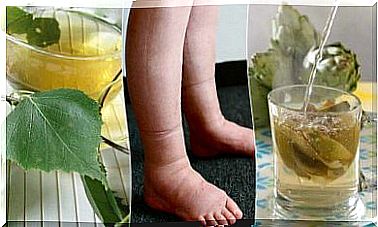Diseases Caused By Vitamin Deficiencies

A lack of sufficient good nutrition can lead to diseases that can be caused by vitamin deficiencies. This is because vitamins are essential micronutrients found in many different foods that people consume regularly, albeit in small amounts.
Until a few years ago, experts talked about the consequences of not consuming certain foods. However, they later discovered (Spanish link) that in reality it was the substances they contain that are important for staying healthy. What if you don’t get enough vitamins?
Diseases that can be caused by vitamin deficiencies
There are a total of thirteen types of vitamins. These all correspond to a group of organic compounds that work together with enzymes and are part of the body’s metabolic processes. Although they are considered micronutrients, they are an essential part of our diet.
When a vitamin deficiency persists in the medium or long term, the risk of developing certain diseases increases. Which are they? Below we will describe the most relevant ones.
Visual disturbances and vitamin A

Vitamin A deficiency is related to visual problems. In particular, it causes dry eyes or xerophthalmia, which can progress to night blindness over time.
So to avoid these complications, you should eat foods that contain it, such as carotenoids. You can usually get vitamin A from foods such as:
- Eggs
- Milk
- Fish, such as salmon
- Liver
- Dark green leafy vegetables
- mangoes
- papayas
- tomatoes
- carrots
- Pumpkin
- Maize
The recommended daily amount of vitamin A depends on age and gender. According to the National Institute of Health (Spanish link), the values for adults are 900 micrograms for men and 700 micrograms for women.
Anemia: Vitamin B12 Deficiency
A vitamin B12 or cobalamin deficiency causes a type of anemia called pernicious anemia. This substance contains cobalt, a necessary mineral for the production of red blood cells.
Since cobalt is only synthesized by bacteria, its contribution in humans is determined by the consumption of foodstuffs of animal origin. For people following a vegan or vegetarian diet, this can therefore pose a problem.
According to agencies such as the National Institutes of Health , the average daily recommended amount of cobalamin for adults is 2.4 micrograms per day. People can get this amount with supplements, especially those on a plant-based diet.
Skin Lesions and Vitamin C Deficiency

In the early stages, vitamin C deficiency can lead to bleeding gums and slow wound healing. However, many years ago, experts discovered that over prolonged periods it causes a pathology called scurvy.
In addition to the symptoms we mentioned, this condition causes fatigue, joint pain, and skin lesions. According to the Food and Agriculture Organization of the United Nations (Spanish link), it has become less common since experts discovered the importance of this nutrient.
Some foods that contain vitamin C include:
- Citrus fruits
- kiwis
- peppers
However, keep in mind that cooking processes or exposure to summer temperatures can lead to loss of this vitamin. For example, a safe option to supplement your diet is to take supplements.
Neurological Disorders and Folic Acid
Several studies have suggested that the intake of folic acid (vitamin B9) by pregnant women prevents neurological disorders in the fetus. In addition, supplementation seems to have other beneficial effects, such as the prevention of congenital heart defects and a cleft lip.
The main food sources of folic acid are:
- green vegetables
- Liver
- Kidneys
According to the World Health Organization (Spanish link) , all women should take 400 µg of folic acid per day from the moment they try to conceive until 12 weeks of pregnancy.
Brittle bones due to vitamin D deficiency
One of the functions of vitamin D is to keep bones healthy through good calcium absorption. Diseases such as English disease and osteomalacia can occur if you don’t get enough vitamin D.
In humans , this vitamin is formed when the skin is exposed to the ultraviolet rays of sunlight. In addition, you can get this from foods of animal origin such as eggs, milk and meat, although this is only about 10% of your needs.
What to remember about the diseases that can be caused by vitamin deficiencies
If you follow a balanced diet, it is unlikely that you are suffering from a vitamin deficiency. However, there may be situations where the daily recommendations should increase, such as during pregnancy or if you suffer from an illness or condition.
If this is the case, it is important to change your diet, as a lack of these micronutrients can lead to health problems. To do this, it is therefore advisable to consult a nutritionist to evaluate the possibility of supplementation.









